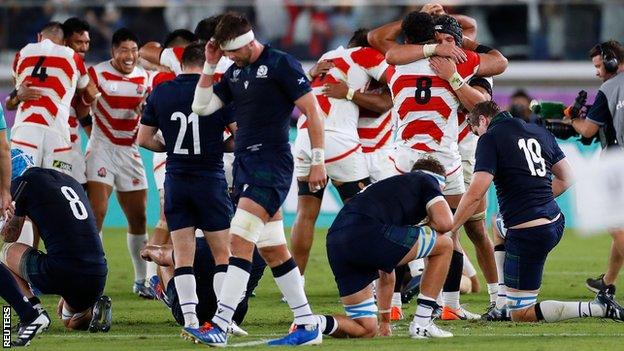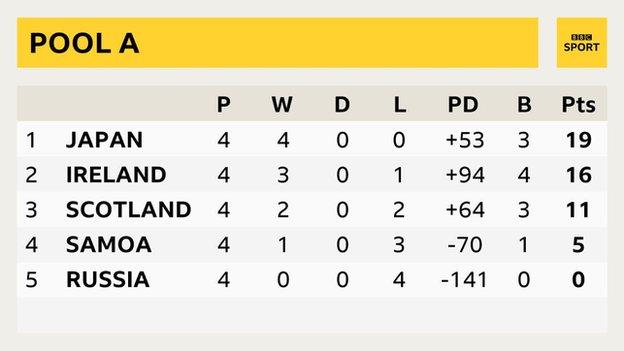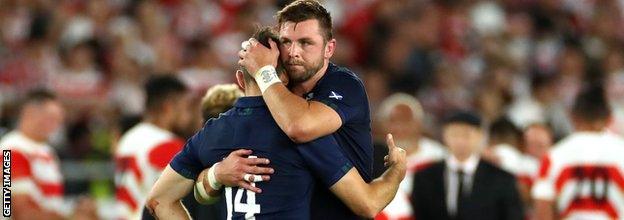Rugby World Cup: 'Support for Gregor Townsend draining after Scotland exit'
- Published

Sunday's defeat by Japan confirmed Scotland's elimination from the Rugby World Cup
When you're reporting on the Scottish rugby team bitter years of experience make you something of a gnarled pro in the post-mortem game. So much hope, so many kicks to places where the sun doesn't shine.
Monday morning dawned in Yokohama. Transport trucks headed for the Scotland team hotel to gather up their tonnage of equipment while arrangements were made for the players to fly home, not all together, but in various job lots over the coming hours and days. Misery reigned.
Four tries conceded amid Japan's blur of movement. Four tries conceded against Ireland at the beginning of the pool. Five tries conceded against England in their last championship match before coming here. Twelve tries conceded in the four Tests that went before. Fourteen conceded in the five competitive Tests before that. Even Mr Magoo could see a theme here.
We've picked over the bones of Scotland's performances so often that they're turning to dust, so let's just revisit Yokohama for a moment because even though Scotland are out of this World Cup you'd need to be a world champion malcontent to not applaud what Japan are doing here.
On Monday the local newspapers - every last one of them - eulogised the Brave Blossoms, a team of magicians who conjured something special against Scotland in an atmosphere that will live forever in the memory of those of us who usually can't even remember where we left the car keys.
Japan's elan on the field and the colour and the noise of their people away from it will not be forgotten no matter what happens in their quarter-final against South Africa. If you're not South African, and you have a soul, then you'll be on Japan's side at the weekend.
A small story here, a little illustration of why us rugby tourists have fallen in love with this team and this country. It was 01:30 on Sunday into Monday and some of us were holed up in a burger place with iffy food but, critically, decent wifi. Video had to be sent. Stress levels were rising.
A woman approached, dressed head to toe in Japan gear. Polite and gentle, she placed a beer on the table for us weary hacks.
"Sorry about the game," she said kindly. Euphoric at her nation's achievement she was not blind to the disappointment of others. It was a charming moment on a riotous night.
'Joseph unleashes his wizards'
We salute Japan for the humility of its people but also because of the adventure of its rugby. We live in an age now where we talk about players as physical and attritional beasts. Whoever has the biggest beasts wins. The game has become a battle of genetics and brutality.
South Africa play a power game. Always have done. They are huge men, the size of mighty oaks. What Japan have shown, and what will give them a huge chance against the Boks, is that there is another way. Speed of thought and speed of movement can, indeed, be a match for grunt, if you move as fast as Japan and marry your pace with accuracy. To win big games Japan prove that your pack doesn't necessarily have to be made up of monsters who eat their young.
Japan are one of the most dynamic, skilful and clinical teams we have ever seen on the world stage. In a time of truckin' it up through the forwards, they rip it up with their flair. They are joyous.

That anthem before kick-off - it was hard to recall one like it. Powerful doesn't cover it. By turns it was inspirational and haunting, the sweep of it lent even more poignancy by the tragedies that had descended on the region not 24 hours earlier. The fatality count from Typhoon Hagibis was in the low 20s at that point. By mid-afternoon on Monday it was in the 40s. Jamie Joseph, the totemic coach, said the squad had spoken about the loss of life in the preamble to the game. Lord knows how emotional those conversations must have been.
Japan are not what most people thought they would be. These World Cup groups were drawn in May 2017 and, on the face of it, it looked like Scotland and Ireland had gotten off lightly. If they both beat Japan (as well as Russia and Samoa) then both would make it through. They knew it would be difficult - Japan were improving - but their results didn't contain any semblance of awe factor.
Scotland had beaten them twice in Japan in 2016. Ireland had put 85 points on them in two Tests in Japan in 2017. Since then, Australia put 63 points on them, New Zealand scored 69 points. On the eve of the World Cup, South Africa beat them 41-7.
Joseph was just biding his time before unleashing his wizards. Their win over Ireland - on the back of Scotland's lamentable loss to Joe Schmidt's team - changed everything. Suddenly, the Scots knew that the appearance of the group had taken on another form. From negotiable, it had become treacherous.
'A big argument for a clear-out'
Of all the World Cup groups that Scotland have been in since the beginning of the tournament in 1987, this turned out to be the hardest, rivalled only by the 2011 World Cup where they were pitched in with - and failed to emerge from - a pool with England and Argentina.
Ireland are a better side than Scotland. Japan are a better side than the pair of them. Scotland finished behind both and that's where they deserved to be. That's the reality. Japan have made the most enormous strides in recent years while Scotland have stalled or have gone backwards.
They contributed handsomely to what was a remarkable game in Yokohama, but there's no comfort in that. A few players were still in something approaching shock over an hour after the game had ended. Some had clearly been crying. One or two, it was said, were crying still. The easiest - and dumbest - thing to say about this team is that they don't care as much as other teams. They do. These guys bust every sinew to deliver, but they weren't good enough, their coaches weren't good enough, their mentality wasn't good enough.
In their two biggest games of this World Cup they were 28-7 down after 43 minutes against Japan and 24-3 down after 56 minutes against Ireland. This is a recurring theme and it's wearying. They were up against better sides, but in four quarters they managed to play well in just one of them. It's pretty dismal stuff.
Scotland can deliver wondrous rugby but only in bits and pieces and too often they deliver when their own errors leave them needing a miracle to repair the damage. Some of the wayward kicking - and the tactical thinking behind it - was dreadful against Japan in that calamitous first half. They deny that they're backsliding as a team but it's hard to argue that they aren't.

Some Scotland players were visibly distraught after the Yokohama loss
In Townsend's first Six Nations they hit a height against England that they haven't hit since. In 2019, Scotland have played nine competitive games and have won three - Italy, Samoa and Russia. They haven't turned over a big dog in a championship game since that victory over England at Murrayfield in the spring of 2018.
The support for Townsend and his coaching staff is draining. There's no sense in jettisoning him, but after this latest failure he's got a massive Six Nations coming up with three of the games away from home - Dublin, Rome and Cardiff - and with a record on the road that makes you wince.
Would another coach - a Vern Cotter type pragmatist, or just plain old Vern Cotter - get more consistency from these players? They're not a bad bunch. When they found something in the second half in Yokohama they looked a very decent outfit. Jamie Ritchie was immense, Jonny Gray produced the kind of angry performance that you want to see him produce every game. Zander Fagerson came off the bench and brought an attitude that we don't see nearly enough of from him. Big Zander could be a colossus for Scotland, if only he had that rage every time he took the field.
In despair, there's hope. Magnus Bradbury, Blade Thomson, Ritchie and Hamish Watson, when fit, are fine players and represent a changing of the back-row guard. Scott Cummings has a real chance at lock. The crisis at loose-head prop now has bells and whistles attached, though. It's the key problem area and it's holding Scotland back.
Outside of loose-head there's enough there to make Scotland competitive. Nobody is expecting heroics, just competitive performances that don't disappear in a puff of smoke after 50 minutes or less. Townsend needs a big Six Nations. He'll keep faith with his coaches - there's a big argument for starting a clear-out and bringing in new thinking - but every one of them is on trial now.
Another failure and those full houses that Scottish Rugby loves to crow about might not be so full any more. Right now, as the party ends and everyone drifts home, everything feels empty.
